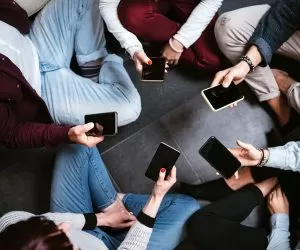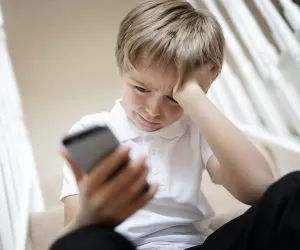12 Reasons Why Cell Phones Should Not Be Allowed in School
If you have ever wondered why cellphones should not be allowed in school, you’re not alone.
As it turns out, handing your child a smartphone is not-so-smart parenting.
According to the CDC, smartphone use may be to blame for unintentional childhood injuries and misbehavior during mealtimes, and that’s just the tip of the iceberg.
According to a study carried out in 2010, 64% of students admitted to using their phones during class.
According to research carried out by The Benenson Strategy Group, 35% of teens admit to using cellphones to cheat during tests.
Children also download papers from online sources and turn them in as their own.
And then there are the psychological and social consequences of taking a cellphone to school that play their part in a child’s downfall.
Contents
1. Kids are Easily Distracted
Whether they’re used by children or adults, cellphones are a distraction.
From the buzz of constant notifications and messages to unexpected calls, our cellphones are the cause of many of the distractions that we are faced with. That goes for school-going children too.
When a child takes their cellphone to school, they remain constantly distracted because that’s the whole idea behind the cellphone’s design; to keep you constantly looking at your phone.
What’s worse is that even when a cellphone is kept on silent mode, the constant expectation of a reward that’s been formed through habit makes it difficult for kids to keep their hands off their cellphones.
2. Poor Grades
New research shows that the overuse of cellphones can result in poor grades. This doesn’t come as a surprise, though, as the inability to think to their full potential makes it even harder for children to get good grades in school.
In a study carried out in 2015, researchers found that children do better in schools where cellphones have been banned.
The researchers divided students into two groups; one group was given access to cellphones while the other group wasn’t. The researchers found that student scores improved by nearly 6% in the group where the use of cellphones had been banned.
It was also found that allowing cellphones in schools negatively affects students who already have low grades.
3. Cyberbullying
One of the most devastating negative impacts of allowing cellphones in schools is that it provides easy access to cyberbullying, which is one of the biggest issues faced by students in this modern age.
While in the past, students who were victims of bullying could feel safe in their homes, with access to cellphones, it has now become easy to harass, threaten, or spread false rumors, with students having access to that information 24/7.
According to recent reports, 1 in every 3 student reports falling victim to cyberbullying at least once.
Cyberbullying is a serious issue that can only be stopped if schools put strict regulations in place, banning the use of cellphones in schools.
4. Inability to Focus
With easy access to a plethora of social media outlets and information at one’s fingertips, it is getting harder for children to stay focused in the classroom.
Apps and web content that are easily accessible via our cellphones have been engineered to be not only user-friendly but also as addictive as possible.
According to research, even the mere presence of a cellphone around a child is enough to significantly reduce their ability to focus. The classroom is a place that’s already filled with distractions.
Dividing one’s attention between chatty classmates, the constantly pinging cellphone, and the lesson that’s being discussed by the teacher makes it even harder for children to stay focused.
5. Complete Homework on Time
Because a cellphone is such a constant distraction, it gets easy for the line between playtime and homework time to get blurred.
What’s worse is, for many students, completing their homework gets even more difficult when they are separated from their phones. That’s because many children use their cellphones to share homework information.
What this means is that taking away your child’s phone could make it harder for them to study their lessons for the day.
However, on the other hand, while some children use their cellphones constructively when it comes to doing their homework, for many other children, the cellphone only becomes a source of distraction, which keeps them from completing their homework on time.
6. Used as a Tool for Escapism
There are also certain social implications of children using cellphones as well. For instance, it has been found that a growing number of school children use their phones as a means for escapism since it’s easy for children to have a best friend online.
The danger is that the cellphone is being exploited by people who want to meet young students online, making children vulnerable to predators, even in the classroom.
As children spend more and more of their time online, the possibility of meeting strangers increases significantly.
According to Pew Research, 79% of girls who meet new friends online are more likely to interact with them in the real world, which leads to a growing number of dangerous – both physically and mentally.
7. Cheating During Tests
Access to a cellphone in the classroom makes it easier for students to cheat during tests. Thanks to these devices, students are no longer required to write answers on small pieces of paper or on their arm anymore.
They can just use their cellphones to record their answers and view them or listen to them during a test or exam.
It is also not unheard of for students to text each other answers to questions in an exam.
While there are ways to find out whether or not a student has cheated, it takes more time out of a teacher’s already busy schedule, which is just another reason why cellphones should be banned from school.
8. Non-Existent Social Life
Again, it’s becoming increasingly noticeable that more and more children are spending their time on their phones instead of going outside.
While in the past, school children had to go to libraries to find the information they need, nowadays, students can get access to just about any information they want to via the internet.
This has resulted in many children having a non-existent social life, where they prefer spending more time in cyberspace than with their friends in the real world.
The easy access to every kind of information under the sun, from TV shows and sports events to social activities, means that many children no longer feel the need to go out and meet or play with their friends.
9. Lack of Physical Activities
For children, taking part in social activities and sports activities are a critical part of their development.
Sadly, a lack of physical activity has been found in an increasing number of children today due to constant access to their cellphones.
We all know that the lack of physical activity in school children can result in obesity, diabetes, and even cardiovascular diseases, along with many other health issues.
Rather than having children standing in the corner of the schoolyard with their faces stuck to their cellphones, schools need to have rules and regulations in place that encourage more physical activity.
10. Can Lead to Peer Pressure
Cellphones can very easily lead to peer pressure. The type of cellphone a child uses can be seen as a status symbol.
This forces children to demand increasingly expensive cellphones and access to the latest models as soon as they hit the market in an attempt to be seen in a certain way by their peers.
The access to social media apps, which allows school students to instantly share information with each other, can also be a source of peer pressure since some children constantly feel that they need to keep up with their peers.
This constant pressure to compete can result in a lot of stress.
11. Causes Emotional Distress
False information that’s spread on social media sites can have a devastating effect on a child’s mind.
An increasing number of school children are reporting that false information about them is being shared online by their peers.
The access to inappropriate and questionable material being spread online can have a negative impact on children, making them more reluctant to go to school and face their peers.
It can also result in depression and emotional distress, which could lead to serious consequences for the children and their families further down the road.
12. Could Lead to Suicide Tendencies
Unlike adults, children have a less-developed ability to control their impulses.
What makes this even worse is the easy access to a plethora of information that is readily accessible at the tap of a finger.
Sadly, cyberbullying has resulted in many school children taking their own lives due to peer pressure and bullying.
Keeping that in mind, schools and parents need to come together to take a stand against the use of cellphones in schools to protect their children and promote their physical and psychological well-being in and outside the classroom.











27 Comments Add one
hello thank you this is so true and we need to help
Yes Student should not be allowed to use cell phone during school hours
Yes, students should not be allowed to use mobile phones all the time to avoid such distraction
we should not be allowed to bring gadgets to school as i myself am in grade 5 and some of my friends are master pros at cheating and may be they can cheat during tests etc.but we should be allowed to use phone thrice a week tho
I feel like the people agreeing with this list are kids who don’t have a phone and thirty-year old moms.
Nice good excuse
No child under 16 should have their own Cellphone. The Health risks,Distraction, Criminals easy access to children, etc.
A computer at home for learning is a better option, and does not involve peer
pressure.
The government should provide lots of free Payphones on the streets, for emergency use, that will back up CCTV.
My grandson has been suspended from school for over 2 weeks, because the school say no phones, but his parents send him to school with a phone in his bag. The school was notified by someone that he did have a phone. The school then wanted to search him, but he said No, and his Parents said No, because they did not want the school to find the phone. Now he is behind in his education. Thanks to his phone!
Is his education & health more important than a phone?
He also wastes large amounts of money on Games on his phone.
A phone for a Child under 16 is a Breach of his Right to education. Something which is now a modern sickness. Phone for the Doctor, before it’s too Late.
I think you are very wrong I myself don’t have a phone but it is such a big distraction so stop lying to yourself
or some ppl not knowing the existing of limited access to phone or screentime
It was a good idea for the students to use cellphones in schools and yet the students are wasting the opportunity and do stupid thing with them during lessons
Yeah! They have a massive source of information just in their fingertips and probably don’t even know how to use it properly.
I absoulty agree with the fact the phones should be not allowed on school premesis but there is a good point in the opposing side.
Students need to focus on school not play on there phones during class
Yeah! thats 100% true
Yes we are not to be allowed to come to school with cellphone
Students should not be allowed to use mobile phone at school else it will cause cheating in test
It is not okay, I am writing a report on it, and I’m using this information.
I strongly agree since my child has been exposed to cyberbullying. They are now downcast. So, I took their phone off of them. Do you have any other suggestions?
i disagree with this, though this websie makes some good points ive seen those who say kids under 16 shouldnt have phones, which i disagree with. phones can be used to help with disabilities (eg. blood sugar monitor for diabetes) or for children safety, if a child is home late or out with friends and dont have a phone if anything happens to them they cant call their parents or the parents cant call their children. i think phones should be allowed during breaks and lunch. plus most of these points can also happen outside of school so it wouldnt help much to ban phones as kids will just get more sneaky in hiding them
i totally agree with you on this, the website does make good points but, phones are brought for important emergency
I feel like kids don’t need them until they are at lest needed for emergences and till there age is 15 and up.
its ok to use mobile phone if only we know what we doing
Thank you this is lot for my daughter debate
Yeah is so true
Can I get the solutions and debate on this topic?
Ur right students should’nt use cell phones at school
I think phones are good and bad at the same time